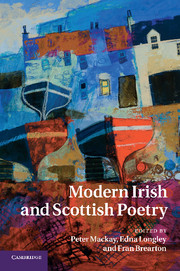Book contents
- Frontmatter
- Contents
- List of contributors
- Acknowledgements
- Introduction
- 1 Swordsmen: W. B. Yeats and Hugh MacDiarmid
- 2 Tradition and the individual editor: Professor Grierson, modernism and national poetics
- 3 Louis MacNeice among the islands
- 4 Townland, desert, cave: Irish and Scottish Second World War poetry
- 5 Affinities in time and space: reading the Gaelic poetry of Ireland and Scotland
- 6 Contemporary affinities
- 7 The Classics in modern Scottish and Irish poetry
- 8 Translating Beowulf: Edwin Morgan and Seamus Heaney
- 9 Reading in the gutters
- 10 ‘What matters is the yeast’: ‘foreignising’ Gaelic poetry
- 11 Outside English: Irish and Scottish poets in the East
- 12 Names for nameless things: the poetics of place names
- 13 Desire lines: mapping the city in contemporary Belfast and Glasgow poetry
- 14 ‘The ugly burds without wings’?: reactions to tradition since the 1960s
- 15 ‘And cannot say / and cannot say’: Richard Price, Randolph Healy and the dialogue of the deaf
- 16 On ‘The Friendship of Young Poets’: Douglas Dunn, Michael Longley and Derek Mahon
- 17 ‘No misprints in this work’: the poetic ‘translations’ of Medbh McGuckian and Frank Kuppner
- 18 Phoenix or dead crow? Irish and Scottish poetry magazines, 1945–2000
- 19 Outwith the Pale: Irish–Scottish studies as an act of translation
- Guide to further reading
- Index
- References
17 - ‘No misprints in this work’: the poetic ‘translations’ of Medbh McGuckian and Frank Kuppner
Published online by Cambridge University Press: 18 April 2011
- Frontmatter
- Contents
- List of contributors
- Acknowledgements
- Introduction
- 1 Swordsmen: W. B. Yeats and Hugh MacDiarmid
- 2 Tradition and the individual editor: Professor Grierson, modernism and national poetics
- 3 Louis MacNeice among the islands
- 4 Townland, desert, cave: Irish and Scottish Second World War poetry
- 5 Affinities in time and space: reading the Gaelic poetry of Ireland and Scotland
- 6 Contemporary affinities
- 7 The Classics in modern Scottish and Irish poetry
- 8 Translating Beowulf: Edwin Morgan and Seamus Heaney
- 9 Reading in the gutters
- 10 ‘What matters is the yeast’: ‘foreignising’ Gaelic poetry
- 11 Outside English: Irish and Scottish poets in the East
- 12 Names for nameless things: the poetics of place names
- 13 Desire lines: mapping the city in contemporary Belfast and Glasgow poetry
- 14 ‘The ugly burds without wings’?: reactions to tradition since the 1960s
- 15 ‘And cannot say / and cannot say’: Richard Price, Randolph Healy and the dialogue of the deaf
- 16 On ‘The Friendship of Young Poets’: Douglas Dunn, Michael Longley and Derek Mahon
- 17 ‘No misprints in this work’: the poetic ‘translations’ of Medbh McGuckian and Frank Kuppner
- 18 Phoenix or dead crow? Irish and Scottish poetry magazines, 1945–2000
- 19 Outwith the Pale: Irish–Scottish studies as an act of translation
- Guide to further reading
- Index
- References
Summary
Little would seem to unite Medbh McGuckian's dislocated lyricism with the mock epigrams and poetic parodies of Frank Kuppner. Yet, as well as being close contemporaries, both poets have occupied, in their respective Northern Ireland and Scotland, positions on the outer rim of the established poets of their generation; both combine formalism with avant-garde or experimental sensibilities, and both have perhaps experienced a falling-off of their readership in recent years. This, in turn, may be related to a certain unco-operative quality which the poets also share. Questions were raised about their audiences' patience long before either really put it to the test. James Simmons famously went so far as to suggest that McGuckian's poems were ‘a salutary joke by one who hates the excesses of reviewers or literary critics or bad poetry and knows she can elicit rave reviews by writing an alluring sort of nonsense’; Robert Crawford foresaw diminishing returns to Kuppner's tricks and repetitions, and suggested: ‘For some readers, Kuppner's work proves too obsessively repetitive, tries too hard to show off.’ In addition to examining these traits, this chapter will argue that Frank Kuppner and Medbh McGuckian also repeatedly present poetry as a kind of translation. I will sketch the different ways in which their ‘translations’ work, and suggest briefly what this insistence on literary mediation might be intended to keep at bay.
- Type
- Chapter
- Information
- Modern Irish and Scottish Poetry , pp. 280 - 293Publisher: Cambridge University PressPrint publication year: 2011
References
- 1
- Cited by

